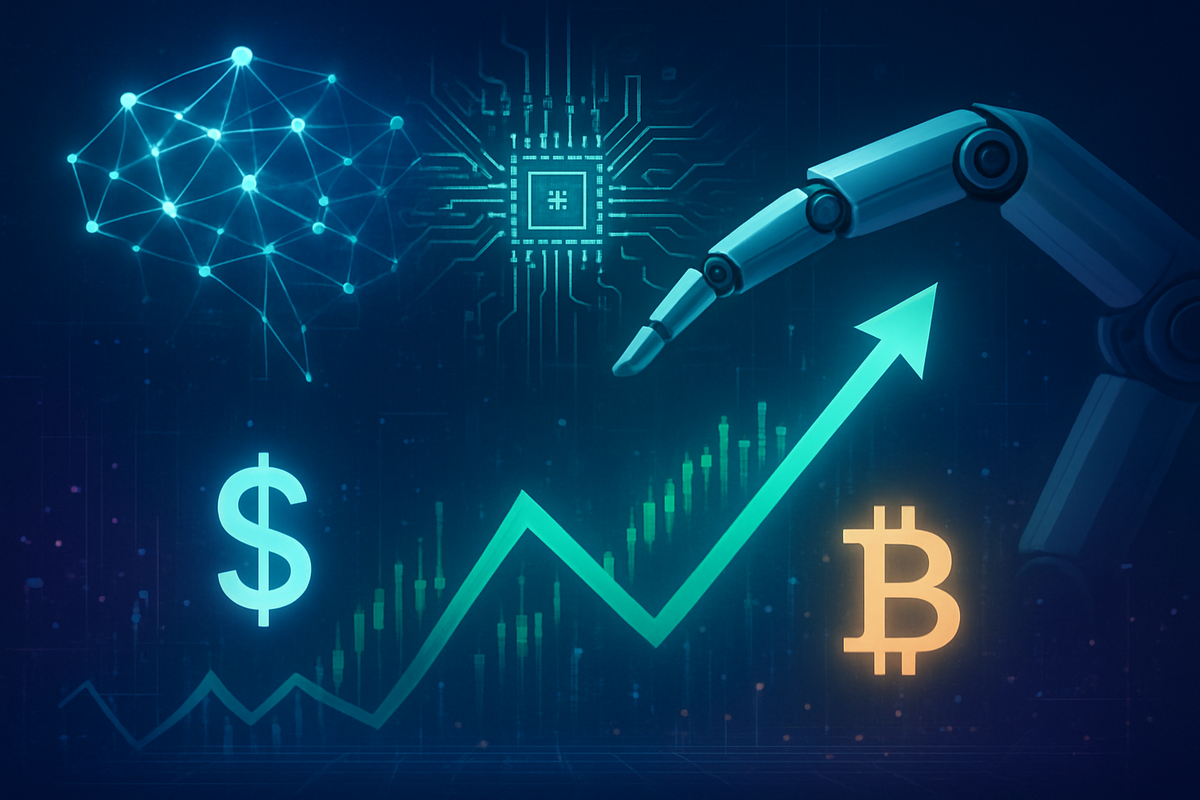The AI Ascent: How Technology's Relentless March is Reshaping Global Stock Markets

As of October 2025, the global financial markets are in the throes of a profound transformation, propelled by a wave of unprecedented technological advancements. Artificial Intelligence (AI), in particular, stands as the undeniable titan, serving as a foundational amplifier across virtually every industry and injecting hundreds of billions of dollars into the global economy. This technological surge has ignited a bullish rally, especially within the United States, driving major indices to new heights and fueling optimism for sustained growth.
However, this exhilarating ascent is not without its shadows. The remarkable concentration of market gains in a select few technology giants, often dubbed the "Magnificent Seven" type companies, has sparked vigorous debate among analysts. Concerns are mounting over potentially stretched valuations, with some drawing parallels to the dot-com era, raising questions about the sustainability of the current trajectory and the specter of a potential "AI bubble" that could lead to a sharp market correction if the promised returns from generative AI fail to fully materialize.
The Epicenter of Innovation: AI, Quantum, and Automation Reshape Industries
The current market dynamism is a direct consequence of several groundbreaking technological innovations reaching critical inflection points. Artificial Intelligence, especially generative AI, is not merely an improvement but a structural transformation. Since late 2022, AI-related stocks have been disproportionately responsible for S&P 500 returns, earnings growth, and capital spending, making AI investments the leading driver of U.S. economic growth in the first half of 2025. This pervasive influence extends from manufacturing efficiency to healthcare diagnostics and advanced cybersecurity.
Beyond AI's immediate impact, 2025 is emerging as a pivotal year for Quantum Computing, as the field transitions from theoretical research to tangible applications. Breakthroughs are anticipated across highly sensitive sectors such as healthcare, cybersecurity, and finance, promising computational capabilities far beyond traditional supercomputers. Concurrently, the Robotics and Automation industry is experiencing unprecedented growth, driven by the seamless integration of AI, declining hardware costs, and an urgent need to address global labor shortages and rising wages. This expansion is evident in everything from sophisticated industrial robots to advanced surgical systems and even autonomous vehicles.
The fundamental bedrock supporting these innovations is the Semiconductor industry, which continues its robust expansion. Projecting a record $697 billion in sales for 2025, semiconductors are the indispensable engine powering AI, 5G, and quantum technologies. Cybersecurity also remains a critical growth sector, with escalating cyber threats, rapid cloud adoption, and stringent regulatory mandates driving demand for AI-driven threat detection and zero-trust frameworks. In parallel, Biotechnology, fueled by AI-driven drug discovery and an aging global population, and Renewable Energy, fueled by the insatiable demand for clean power (partly to support energy-intensive AI), are attracting significant investor interest, signaling a holistic technological revolution.
Winners and Watchers: Companies Riding the Tech Wave
The current technological paradigm shift is creating clear winners and posing significant challenges for others in the market. At the forefront of this surge are technology giants heavily invested in AI. Nvidia (NASDAQ: NVDA) continues to dominate, leading the tech sector with its unparalleled GPU technology, which is indispensable for AI training and deployment. Its robust earnings and strong AI growth have propelled its valuation to unprecedented levels. Similarly, Microsoft (NASDAQ: MSFT) is a major beneficiary, powering tech momentum through its Azure cloud services and strategic AI initiatives, including a significant stake in OpenAI. Alphabet (NASDAQ: GOOGL), with its Google Quantum AI and the "Willow" quantum processor, is also a key player, accelerating AI model training and leveraging its vast data infrastructure.
In the burgeoning quantum computing space, IonQ (NYSE: IONQ) has seen impressive surges, with its shares soaring over 80% in 2025 alone through mid-October, thanks to its room-temperature quantum technology. IBM (NYSE: IBM) remains a pioneer, with its quantum devices in the cloud and the widely used Qiskit software, aiming for "quantum advantage" by year-end. The robotics and automation sector sees companies like UiPath (NYSE: PATH) leading in robotic process automation, while Intuitive Surgical (NASDAQ: ISRG) maintains its dominance in surgical robotics with the da Vinci system. Tesla (NASDAQ: TSLA) is pushing boundaries in autonomous driving and humanoid robotics, with ambitious plans for a robotaxi service. Beyond these direct tech plays, the renewable energy sector is also gaining, with companies like Boralex (TSX: BLX) and Brookfield Renewable (NYSE: BEPC) poised for significant growth as the world shifts to clean energy to power these new technologies.
Conversely, companies that are slow to adapt or integrate these transformative technologies risk falling behind. Traditional industries that fail to embrace AI for efficiency gains or automation for cost reduction may find themselves outmaneuvered by more agile competitors. Furthermore, the intense capital expenditure required for AI infrastructure, semiconductor manufacturing, and quantum research means that smaller players without significant funding or strategic partnerships could struggle to keep pace, potentially leading to increased consolidation across various tech-driven sectors. The "AI bubble" concerns also suggest that companies with inflated valuations but lacking substantial, profitable AI applications could face significant corrections, impacting both their stock performance and investor confidence.
Broader Implications: A New Industrial Revolution
The current technological surge transcends mere market fluctuations; it represents a new industrial revolution with profound wider significance. Artificial Intelligence is not just a tool but a structural transformation, fundamentally altering business models, supply chains, and labor markets across the globe. This era is characterized by an accelerated digital transformation, where data-driven insights and automated processes become the norm, redefining productivity and innovation. The energy transition is another critical trend, with the immense power demands of AI data centers driving increased investment in renewable energy sources, creating a symbiotic relationship between advanced technology and sustainable infrastructure.
The ripple effects of these advancements are far-reaching. Competitors in every industry are compelled to invest heavily in AI and automation to remain relevant, leading to a potential arms race in technological adoption. This could reshape competitive landscapes, favoring agile and tech-forward enterprises. Policy implications are also emerging rapidly; governments worldwide are recognizing the strategic importance of these technologies. Initiatives like India's Production-Linked Incentive (PLI) scheme for semiconductor manufacturing, increased government funding for quantum computing for national security, and evolving cybersecurity regulations underscore a global push to foster domestic capabilities and protect critical infrastructure. Historically, such transformative periods, like the industrial revolution or the internet boom, have always brought about significant societal and economic shifts, and the current era, while presenting unprecedented opportunities, also echoes the speculative fervor and subsequent corrections seen in events like the dot-com bubble, necessitating careful navigation from policymakers, businesses, and investors alike.
The Road Ahead: Navigating a Future Defined by Innovation
Looking ahead, the short-term and long-term possibilities stemming from these technological advancements are immense and varied. In the immediate future, we can anticipate continued aggressive investment in AI research and development, with a focus on refining generative AI models, improving their efficiency, and broadening their applications across specialized domains. Quantum computing is expected to make further strides toward achieving "quantum advantage," potentially unlocking solutions to problems currently intractable for even the most powerful supercomputers. Robotics and automation will likely see deeper integration into daily life and industrial processes, addressing critical labor gaps and enhancing operational efficiencies.
However, these opportunities come with inherent challenges. The ethical implications of advanced AI, the need for robust cybersecurity infrastructure to protect increasingly interconnected systems, and the societal impact of widespread automation on employment will require careful consideration and strategic adaptation. Companies will need to pivot their strategies to integrate these technologies effectively, focusing not just on adoption but on maximizing their return on investment. New market opportunities will emerge in areas like AI-powered personalized medicine, advanced materials, and sustainable energy solutions tailored for high-tech demands. Potential scenarios range from a continued bullish market, driven by genuine productivity gains from AI, to a more volatile period characterized by market corrections if the hype outpaces real-world profitability, underscoring the need for prudent investment and strategic foresight.
Concluding Thoughts: A Transformative Era with Measured Optimism
In summary, the current stock market growth is undeniably anchored in the rapid pace of technological advancements, with Artificial Intelligence serving as the paramount catalyst. From the explosive growth in AI-related capital expenditures to the foundational role of semiconductors and the burgeoning potential of quantum computing, these innovations are driving economic expansion and reshaping industries at an unprecedented scale. While the market exhibits strong bullish tendencies, particularly in the tech sector, the concentration of gains and concerns about stretched valuations highlight the importance of a nuanced perspective.
Moving forward, investors should remain vigilant, closely monitoring the actualization of AI's promised returns, regulatory developments impacting tech giants, and the broader macroeconomic environment, including central bank policies. The transformative power of these technologies is undeniable, heralding an era of innovation that promises to redefine productivity and societal capabilities. However, a balanced approach, combining enthusiasm for groundbreaking advancements with a healthy dose of skepticism regarding speculative excesses, will be crucial for navigating the opportunities and challenges of this exciting, yet potentially volatile, technological epoch.
This content is intended for informational purposes only and is not financial advice



